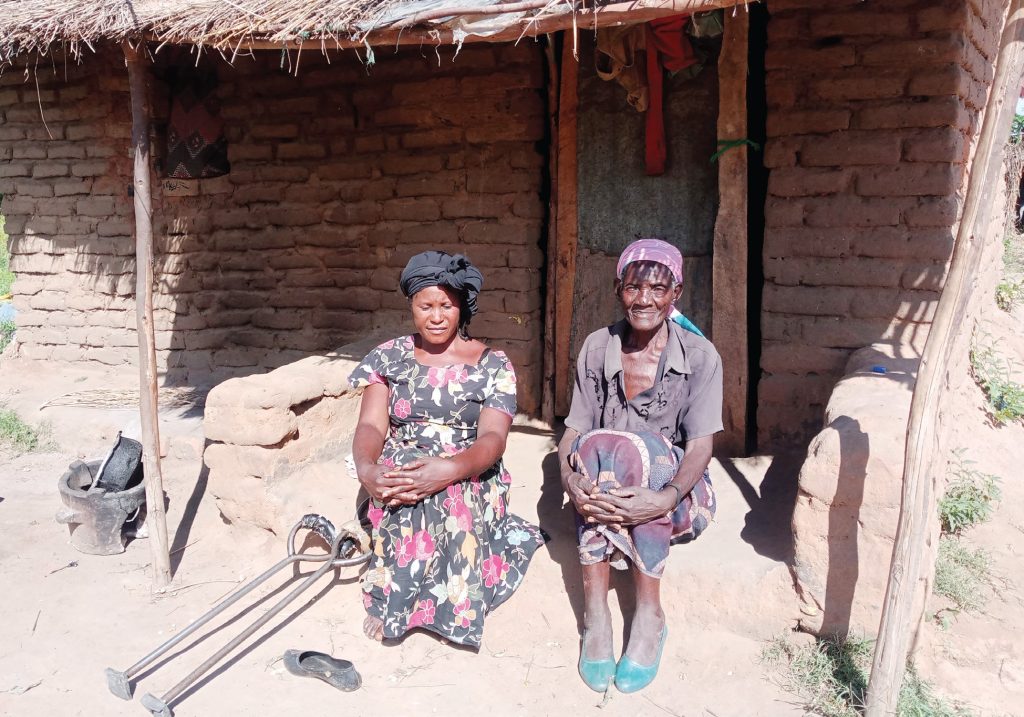In 1976, Tilile Nabanda of Mponda Village, Traditional Authority (T/A) Kaomba in Kasungu District, delivered a baby with malformed legs.
In her early 70s, the woman wished she had given baby Monica “the best care a parent can provide”, but could not afford a wheelchair to take her to school.
Monica (L) with her mother, Nabanda
Monica, now 48, needed assistance to go to school, but her parents could not afford assistive devices.
“She skipped classes and quit school in Standard Seven and can neither read nor write,” says Nabanda.
Monica says she regrets missing out on education.
“I wanted to learn, but schools were too far. With a simple wheelchair, my story would have been different,” she says.
Her two children dropped out of school when her husband disappeared.
“He told me he was going to work in Lilongwe, but never returned,” Monica says.
The children do piecework to support her, deepening a cycle of poverty.
Monica blames the deepening poverty on low education attainment.
Kasungu district social welfare officer Ephraim Njikho says people with disabilities often suffer in silence because “they are confined to their homes”.
“When they meet difficult situations, including exclusion from socioeconomic opportunities, they don’t come in the open. They are invisible,” he observes.
Njikho says persons with disabilities need to enjoy their rights like anyone else.
Kasungu District Disability Forum chairperson Esther Luhana says poverty and illiteracy are disproportionately high in families headed by persons with disability.
“While there may be some systematic exclusion in some cases, the major cause of poverty is that most of our members did not get proper education or adequate support because of their conditions,” she argues.
According to the 2018 census, 90 percent of about 1.5 million people with disabilities in Malawi live in rural areas where many survive on subsistence farming.
The International Labour Organisation (ILO) of the United Nations is implementing the Sparking Disability Inclusive Rural Transformation (Spark) project in Kasungu, Thyolo, Nkhata Bay and Chitipa. The project empowers persons with disabilities, particularly women and the youth, to participate in and benefit from community initiatives tailored to their specific disabilities, priority needs, constraints and opportunities.
The two-year project promotes employment opportunities for people with disabilities in programmes supported by the International Fund for Agriculture Development (Ifad), the UN Nations community development arm.
National Spark project officer Vincent Kavala says about 300 people have found opportunities in the Ifad projects such as Transforming Agriculture through Diversification and Entrepreneurship (Trade) and Financial Access for Rural Markets, Smallholders and Enterprise (Farmse).
“We are targeting people with any impairment through a rights-based approach to inclusion. We understand that people with disabilities face several barriers, including attitudes from communities, extension officers and inaccessible infrastructure which hinder their participation,”he says.
Spark seeks to include 428 people from T/As Chulu, Chisemphere, Kaluluma and Kaomba in Kasungu in Ifad projects by December.
It has trained 20 disability Inclusion facilitators in each district to train staff in Ifad-funded initiatives to include people with disabilities in the various livelihood and agricultural value chain programmes.
The UN disability inclusion policy supports mainstreaming disability inclusion to promote decent work for all.
Malawi Council for Disability Affairs (Macoda) district manager Wisdom Mseteka says the Spark project has emboldened persons with disabilities to fight for inclusion in community projects and strengthened the capacity of disability organisations to represent their members’ needs effectively.
“There are many people who live in circumstances similar to Monica’s, but we thank the Spark project for uplifting their lives and giving them the dignity they deserve,” he says.
Mseteka hails the says through pep talk from inclusion facilitators, that most people with disabilities have joined cooperatives and farmers’ clubs to uplift their livelihoods.
Through the project, Macoda has identified people with disabilities and linked them with service providers.
Mseteka states: “Over 131 people, including Monica, have received assistive devices, including tricycles and clutches so that they can fully participate in development activities and businesses.
“We want total inclusion, ensuring the rights of people with disabilities are respected and recognised at all levels. We do not want them to lag.
ILO implements the $230 000 (about K400 million) project with the Ministry of Gender, Community Development and Social Welfare, the Federation of Disability Organisations in Malawi, the Ministry of Labour, the Malawi Congress of Trade Union, and the Employers Consultative Association of Malawi.
The post Sparking disability inclusion first appeared on Nation Online.
The post Sparking disability inclusion appeared first on Nation Online.
 Moni Malawi
Moni Malawi 
